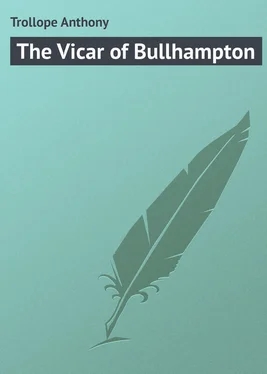Anthony Trollope - The Vicar of Bullhampton
Здесь есть возможность читать онлайн «Anthony Trollope - The Vicar of Bullhampton» — ознакомительный отрывок электронной книги совершенно бесплатно, а после прочтения отрывка купить полную версию. В некоторых случаях можно слушать аудио, скачать через торрент в формате fb2 и присутствует краткое содержание. Жанр: foreign_prose, на английском языке. Описание произведения, (предисловие) а так же отзывы посетителей доступны на портале библиотеки ЛибКат.
- Название:The Vicar of Bullhampton
- Автор:
- Жанр:
- Год:неизвестен
- ISBN:нет данных
- Рейтинг книги:5 / 5. Голосов: 1
-
Избранное:Добавить в избранное
- Отзывы:
-
Ваша оценка:
- 100
- 1
- 2
- 3
- 4
- 5
The Vicar of Bullhampton: краткое содержание, описание и аннотация
Предлагаем к чтению аннотацию, описание, краткое содержание или предисловие (зависит от того, что написал сам автор книги «The Vicar of Bullhampton»). Если вы не нашли необходимую информацию о книге — напишите в комментариях, мы постараемся отыскать её.
The Vicar of Bullhampton — читать онлайн ознакомительный отрывок
Ниже представлен текст книги, разбитый по страницам. Система сохранения места последней прочитанной страницы, позволяет с удобством читать онлайн бесплатно книгу «The Vicar of Bullhampton», без необходимости каждый раз заново искать на чём Вы остановились. Поставьте закладку, и сможете в любой момент перейти на страницу, на которой закончили чтение.
Интервал:
Закладка:
Now the Balfours were considerable people at Loring, though their property was not county property; and it was always considered that Janet Balfour might have done better than she did, in a worldly point of view. Of that, however, little had been said at Loring, because it soon became known there that she and her husband stood rather well in the country round about Bullhampton; and when she asked Mary Lowther to come and stay with her for six months, Mary Lowther's aunt, Miss Marrable, had nothing to say against the arrangement, although she herself was a most particular old lady, and always remembered that Mary Lowther was third or fourth cousin to some earl in Scotland. Nothing more shall be said of Miss Marrable at present, as it is expedient, for the sake of the story, that the reader should fix his attention on Bullhampton till he find himself quite at home there. I would wish him to know his way among the water meads, to be quite alive to the fact that the lodge of Hampton Privets is a mile and a quarter to the north of Bullhampton church, and half a mile across the fields west from Brattle's mill; that Mr. Fenwick's parsonage adjoins the churchyard, being thus a little farther from Hampton Privets than the church; and that there commences Bullhampton street, with its inn, – the Trowbridge Arms, its four public-houses, its three bakers, and its two butchers. The bounds of the parsonage run down to the river, so that the Vicar can catch his trout from his own bank, – though he much prefers to catch them at distances which admit of the appurtenances of sport.
Now there must be one word of Mary Lowther, and then the story shall be commenced. She had come to the vicarage in May, intending to stay a month, and it was now August, and she had been already three months with her friend. Everybody said that she was staying because she intended to become the mistress of Hampton Privets. It was a month since Harry Gilmore had formally made his offer, and as she had not refused him, and as she still stayed on, the folk of Bullhampton were justified in their conclusions. She was a tall girl, with dark brown hair, which she wore fastened in a knot at the back of her head, after the simplest fashion. Her eyes were large and grey, and full of lustre; but they were not eyes which would make you say that Mary Lowther was especially a bright-eyed girl. They were eyes, however, which could make you think, when they looked at you, that if Mary Lowther would only like you, how happy your lot would be, – that if she would love you, the world would have nothing higher or better to offer. If you judged her face by any rules of beauty, you would say that it was too thin; but feeling its influence with sympathy, you could never wish it to be changed. Her nose and mouth were perfect. How many little noses there are on young women's faces which of themselves cannot be said to be things of beauty, or joys for ever, although they do very well in their places! There is the softness and colour of youth, and perhaps a dash of fun, and the eyes above are bright, and the lips below alluring. In the midst of such sweet charms, what does it matter that the nose be puggish, – or even a nose of putty, such as you think you might improve in the original material by a squeeze of your thumb and forefinger? But with Mary Lowther her nose itself was a feature of exquisite beauty, a feature that could be eloquent with pity, reverence, or scorn. The curves of the nostrils, with their almost transparent membranes, told of the working of the mind within, as every portion of human face should tell – in some degree. And the mouth was equally expressive, though the lips were thin. It was a mouth to watch, and listen to, and read with curious interest, rather than a mouth to kiss. Not but that the desire to kiss would come, when there might be a hope to kiss with favour; – but they were lips which no man would think to ravage in boisterous play. It might have been said that there was a want of capability for passion in her face, had it not been for the well-marked dimple in her little chin, – that soft couch in which one may be always sure, when one sees it, that some little imp of Love lies hidden.
It has already been said that Mary Lowther was tall, – taller than common. Her back was as lovely a form of womanhood as man's eye ever measured and appreciated. Her movements, which were never naturally quick, had a grace about them which touched men and women alike. It was the very poetry of motion; but its chief beauty consisted in this, that it was what it was by no effort of her own. We have all seen those efforts, and it may be that many of us have liked them when they have been made on our own behalf. But no man as yet could ever have felt himself to be so far flattered by Miss Lowther. Her dress was very plain; as it became her that it should be, for she was living on the kindness of an aunt who was herself not a rich woman. But it may be doubted whether dress could have added much to her charms.
She was now turned one-and-twenty, and though, doubtless, there were young men at Loring who had sighed for her smiles, no young man had sighed with any efficacy. It must be acknowledged, indeed, that she was not a girl for whom the most susceptible of young men would sigh. Young men given to sigh are generally attracted by some outward and visible sign of softness which may be taken as an indication that sighing will produce some result, however small. At Loring it was said that Mary Lowther was cold and repellent, and, on that account, one who might very probably descend to the shades as an old maid in spite of the beauty of which she was the acknowledged possessor. No enemy, no friend, had ever accused her of being a flirt.
Such as she was, Harry Gilmore's passion for her much astonished his friends. Those who knew him best had thought that, as regarded his fate matrimonial, – or non-matrimonial, – there were three chances before him: he might carry out their presumed intention of marrying money; or he might become the sudden spoil of the bow and spear of some red-cheeked lass; or he might walk on as an old bachelor, too cautious to be caught at all. But none believed that he would become the victim of a grand passion for a poor, reticent, high-bred, high-minded specimen of womanhood. Such, however, was now his condition.
He had an uncle, a clergyman, living at Salisbury, a prebendary there, who was a man of the world, and in whom Harry trusted more than in any other member of his own family. His mother had been the sister of the Rev. Henry Fitzackerly Chamberlaine; and as Mr. Chamberlaine had never married, much of his solicitude was bestowed upon his nephew.
"Don't, my dear fellow," had been the prebendary's advice when he was taken over to see Miss Lowther. "She is a lady, no doubt; but you would never be your own master, and you would be a poor man till you died. An easy temper and a little money are almost as common in our rank of life as destitution and obstinacy." On the day after this advice was given, Harry Gilmore made his formal offer.
CHAPTER II.
FLO'S RED BALL
"You should give him an answer, dear, one way or the other." These wise words were spoken by Mrs. Fenwick to her friend as they sat together, with their work in their hands, on a garden seat under a cedar tree. It was an August evening after dinner, and the Vicar was out about his parish. The two elder children were playing in the garden, and the two young women were alone together.
"Of course I shall give him an answer. What answer does he wish?"
"You know what answer he wishes. If any man was ever in earnest he is."
"Am I not doing the best I can for him then in waiting – to see whether I can say yes?"
"It cannot be well for him to be in suspense on such a matter; and, dear Mary, it cannot be well for you either. One always feels that when a girl bids a man to wait, she will take him after a while. It always comes to that. If you had been at home at Loring, the time would not have been much; but, being so near to him, and seeing him every day, must be bad. You must both be in a state of fever."
Читать дальшеИнтервал:
Закладка:
Похожие книги на «The Vicar of Bullhampton»
Представляем Вашему вниманию похожие книги на «The Vicar of Bullhampton» списком для выбора. Мы отобрали схожую по названию и смыслу литературу в надежде предоставить читателям больше вариантов отыскать новые, интересные, ещё непрочитанные произведения.
Обсуждение, отзывы о книге «The Vicar of Bullhampton» и просто собственные мнения читателей. Оставьте ваши комментарии, напишите, что Вы думаете о произведении, его смысле или главных героях. Укажите что конкретно понравилось, а что нет, и почему Вы так считаете.












